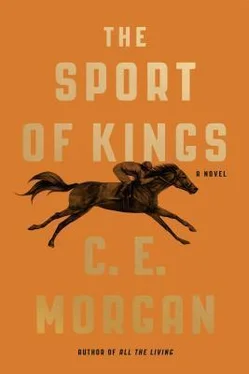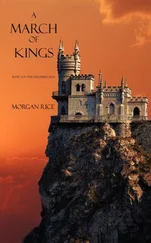* * *
So in the second month our Kentucky Colonel is soothed. It’s surely emerging, the tiny, twinging child: come, apple seed, tiny globular thing, shiny as mail and newly recognizable — ancestor in egress; a simple fish, then a tadpole, which crowns and rears, reptilian eyes engorging, then the smallest horse. It makes imperceptible movements full of meaning. Its heart beats time on Henry’s drum. It will fill the frame of hope.
* * *
In the third month, fact asserts itself through the flexing wall of Henrietta’s belly. But Henrietta herself is now marked by a strange and preternatural calm, a deep silence roosting in her bones. It’s like the glassy calm that surrounds a ship on a windless day, and her lassitude is worse than her previous anguish. What does she know that Henry doesn’t? What secret is she keeping in that growing belly? Does she actually think she’s growing a brand-new thing that will burst into life’s bright pavilion? Warm blood doesn’t spring from cold, nor bronze from gold—
Henrietta: Oh, come on, the Thoroughbred was a late hybridization, a mongrelization. That’s why they’re so strong.
Henry: The breed is genetically pure.
Henrietta: No, they married the sturdy English mares to the fast Moors—
Henry: Blood will always tell.
Henrietta: They were looking for free forward motion! Don’t you understand?
Henry: Purity builds the empire.
Henrietta: They made the world modern!
* * *
In the fourth month, Henry stubs his hotblood fingers deep into the curlicut channels of his ears, where no anxiety can wend its way into the old family brain. In that darkling matter grows a perfect, unalloyed specimen of his own making — now a pale clenched limb beginning to sprout hide, lengthening and straightening, testing newfound muscles from neck to wet tail, now wriggling here and there and growing heavy as platinum, waiting and preparing for the blast of life when with new-sprouted wings, which unfurl like translucent flags — vestiges of divinity — Pegasus will leap from his mother’s neck, whose spilled blood frees him to fly.
* * *
In the fifth month Henry’s terror grows steadily in the womb of his mind. What if the Blood Horse is born of Soured Milk? What if there exists no vestige of divinity at all but only a satyr, that beast of horsetail, cloven hoof, and black, pugnacious eye? It’s all her fault — seductress! She was too voluptuous, too hot-blooded and luxuriant. She lay in the undulatory grasses under green, fireworking trees, drunk on the liquor of Nature when the Other pricked her lip and butterflied her and split the red carbuncle. See how the ordered marvels have been made vulgar! Now the invasive little goat floats in the tendrils of his sodden horse’s tail; he is swilling her dark wine, strangely robust and grinning, that swarthy little fiend already stroking himself erect, good for nothing and unfit for work, a mother’s trouble and Nature’s excess, the child of a warmongering Orangutan and a woman, Simia satyrus. The bestiaries will designate him an indolent cline.
* * *
And now the thing is kicking her in the sixth month — she’s doubled over, a portrait of suffering. She grips her belly and moans, but all with the detached resignation of a fettered stock animal at the plow. Oh, Henry Forge, what have you wrought with your diseased imagination? What grotesque develops in that belly, bred by the convergence of father and daughter, that crime against Nature: hairy, fully grown ghouls with legs for arms and lips for eyes, sickly, feeble children with horns, perversions with four hands or as many flippers, beaked or tailed, fused ass to ass, a brand-new generation of evil so incontrovertible it should be killed at birth like the monsters of Krakow or Ravenna, disfiguration bequeathed upon them by the sins of the father—
NO. Stop, Henry. STOP STOP STOPSTOPSTOPSTOPSTOPSTOP
* * *
Lou stood with her arm thrust up to the elbow in the uterus of a bay mare. Her neck was loose, her shoulders free, the silver in her bun sparking off the sun just now peeking out from smoky shower clouds. She squinted under a skylight, stinging tears coursing along her cheeks, her sunglasses accidentally smashed on the floor of her truck. But her eyes weren’t really necessary for this work, her hands pressing right and left for the pulse of life. Finally she detected them — not one but two.
In her awkward position, there was nothing she could do but tilt her head away from the light streaming through the skylight, one of dozens Mack had installed in his training center’s barns to increase the tidal sloshing of the mares’ hormones. Pretty extravagant, some might say, but she had no opinion on the matter. She cared only about the animals, not their surroundings or their owners and their accomplishments. Some despised the industry for its abuses, some pursued its glories thoughtlessly, but so long as horses existed in proximity to humanity, the industry wasn’t going anywhere, and neither was she.
Horses had always been deeply compelling to her, still were. She could find few points of connection between herself and these animals. Her favorite professor at Cornell had always emphasized this. Every day, your job will be about another animal’s body. Never confuse it with your own. Approach every animal as though you’ve never seen the species before and nothing will ever get past you.
She’d always done her best to abide by this truth; in the barn, as in life, she tried to approach things unhampered by the baggage of excessive opinions. What good were they anyway? Opinions broke up marriages and started wars. Her husband sometimes accused her of being stubbornly apolitical, but what did she — one woman in Bourbon County, Kentucky — really understand of anything? And who cared what she thought? She didn’t need opinions to convince herself that she mattered. When you grow up the last of six children, you know your place in the world.
I do not understand what I do not understand.
Her right side was fatigued from work with the mares, so it was a good thing her palpating side was so strong and her hands so nimble. She managed to separate the two embryos instead of accidentally swooping the whole package into one hand and killing both. Her fingers separated out one twin and pinched hard until its tiny burgeoning life was aborted. The risk, of course, was that you might be pinching the next Man o’ War or Seattle Slew, but that was just part of the gamble. Spare them both and you’d end up with two weak, undersized foals.
Lou withdrew her arm and patted the mare once on the round of her rump before peeling off her lubricated glove. Light-drawn tears were still streaming down her cheeks when she detected a presence behind her. She turned and saw a distorted shadow swimming in the pool of her tears. With an ungainly gesture, not unlike a cow swiping at flies, she wiped her eyes with the cotton on her shoulders and looked up again to see Henrietta Forge standing in front of her, her belly bossed out, heavily pregnant. Lou couldn’t swallow her surprise: “Oh!” The bump was incongruous, as unexpected as a dirty joke on the lips of a child.
“Hello,” said Henrietta, unmistakably tired, the voice of a woman carrying an enormous burden. The sound alone made Lou’s hips ache in sympathy; she instantly remembered her ninth month, when the fun was over and the anxious desperation had set in.
“Let me wash my hands,” said Lou. She untied the mare, scooted her gear bag out of the stall with the toe of her hiking boot, and moved without rushing to a barn sink, where she soaped up to the elbows. She cast a curious glance at Henrietta, who remained where she stood in the streaming light, a rustic Madonna in the sun-splashed shed row, her belly all aflame. Lou said easily, “How old are you now, Henrietta?”
Читать дальше
Конец ознакомительного отрывка
Купить книгу












